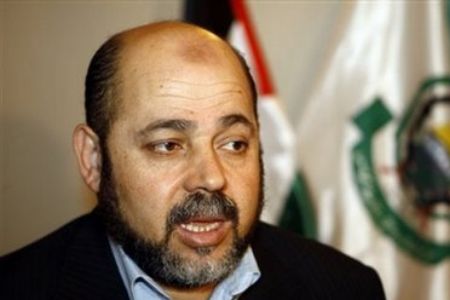UPDATES
Hamas interview reveals no hint of moderation
April 27, 2012 | Ahron Shapiro

Give him credit for his candour. In an extensive interview with the Forward published on April 19, Mousa Abu Marzook, Deputy Director of Hamas’ political bureau and the group’s second-highest-ranking official, told the Jewish newspaper that Hamas would not respect a peace treaty with Israel signed by the Palestinian Authority, even if the agreement was endorsed by a referendum of all Palestinians, as Hamas has always demanded.
Moreover, Abu Marzook vowed that Hamas would never recognise Israel. The most Hamas would consider would be a ceasefire agreement, he said.
“We will not recognise Israel as a state. It will be like the relationship between Lebanon and Israel or Syria and Israel.”
Syria and Lebanon of course remain in a formal state of war with Israel, and Syria continues to sponsor terrorism – much of it through Lebanon – against Israel.
For what it’s worth, Abu Marzook refused to frame Hamas’ refusal to accept more than a ceasefire with Israel as a negative. On the contrary, he tried to sell the concept to his interviewer as a vast improvement over the current situation for all concerned.
“Let’s establish a relationship between the two states in the historic Palestinian land as a hudna [ceasefire] between both sides,” he said. “It’s better than war and better than the continuous resistance against the occupation. And better than Israel occupying the West Bank and Gaza, making all these difficulties and problems on both sides.”
The Forward noted that, contrary to some recent news reports, Abu Marzook brought nothing new to the interview to suggest Hamas was in any way moderating its long-standing positions against Israel. The positions outlined by the Hamas official continue to fall far short of the prerequisites demanded by the Mideast Quartet before Hamas will be accepted by the international community as a legitimate negotiating partner.
Meanwhile, one exchange in the interview offered a particular insight into the worldview of someone like Abu Marzook – smart and sophisticated in some ways, yet from a milieu in which extremism and antisemitism is the norm and largely unquestioned. The interviewer asked about the antisemitic elements of Hamas charter and particularly is citation of the notorious antisemitic forgery, The Protocols of the Elders of Zion.
As for the Protocols, “The Zionists wrote it, and they said, ‘No, we didn’t.‘ [It’s] linked to Zionists,” he said.
Informed that the document was, in fact, a forgery, Abu Marzook appeared nonplussed. “Really? This is the first time I know [about this],” he said.
In response to the interview, some dovish analysts told the Forward that simply agreeing to be interviewed at length by a Jewish newspaper was a step forward for Hamas. However, David Makovsky, a senior fellow at the Washington Institute for Near East Policy, said it was impossible to ignore the content of Abu Marzook’s message.
Said Makovsky:
“Unfortunately, it’s a validation of those who believe Hamas has a far way to go before it becomes a legitimate Palestinian interlocutor.”
The entire report on the interview can be accessed on the Forward‘s website.
Meanwhile, in related news, Hamas has reportedly held a vote in Gaza in an apparent effort to revamp its movement-wide leadership lineup. The vote has been framed as an effort to reconcile an apparent rift between Hamas’ separate leadership structures in Gaza and the diaspora.
This rift moved into the spotlight following the Doha Agreement in February. You will remember that at that time, Hamas’ diaspora leader Khaled Meshaal agreed to the implementation of a unity agreement with the Palestinian Authority, represented by Mahmoud Abbas. The deal was immediately slammed by Hamas’ Gazan leaders and has yet to be implemented.
The latest vote is also seen as a way to resolve an internal conflict within Hamas over whether to continue the organisation’s close operational ties with Iran, or realign itself with the new Egypt or another regional player, like Qatar. Meshaal’s decision to uproot the organisation’s headquarters from Damascus in light of the Syrian unrest is also seen as a factor in the vote, as the movement seeks to unify its direction in the face of rapidly shifting regional developments.
Ahron Shapiro
Tags: Islamic Extremism





